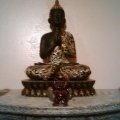Welcome home! Please contact lincoln@icrontic.com if you have any difficulty logging in or using the site. New registrations must be manually approved which may take several days. Can't log in? Try clearing your browser's cookies.
Emptiness in The Guardian
I am unapologetically naive and optimistic about life and the future of humanity, and, so, when I see meditation, yoga, healthy eating etc. becoming mainstream then I feel very excited and enthusiastic about the direction that we are heading (but, but... TRUMPPPP!!!).
So, imagine my smile when I see an article in The Guardian discussing emptiness, of all things! Pretty cool, I think.
https://www.theguardian.com/lifeandstyle/2017/oct/13/why-an-empty-existence-makes-sense-buddhism
7







Comments
Not a bad article - readable and short
The book referenced in the article was the outcome of Robert Wright teaching this course:
https://online.princeton.edu/course/buddhism-and-modern-psychology
I took it a while a back, and it was a fascinating discussion about how Buddhism is a big middle finger to evolution - or at least to the drives and mindset that evolution has given us.
It would seem the Buddha Dharma continues to penetrate the very fabric of society... ...Where seeds of Awakening are being sown...No doubt some seeds will fall by the wayside, some will reach fertile ground....
When the pupil is ready...The Master will appear
Good point @nakazcid
Evolution has made us fearful, greedy, mindless, mad, angry, on the way to death etc (damn dukkha) ... and yet ...
Doctors are fighting our fragility and spiritual practice is overcoming our non Buddha Nature. Despite dinosaurs and our base nature we can to a degree do better.
What a plan. I'll join. ??
The Buddhism and Modern Psych course is super interesting. The interaction with the people taking it is, as usual, the most valuable part (IMO). I've done the course twice, and actually moderated it as well a couple of rounds. Fascinating discussions there, for sure.
Make sure as you note that seeds are planted, in yourself or others, that you help cultivate them as well. Just like a garden, you might prepare it well, but you don't stop at throwing some seeds in the prepared soil. You must baby the seed as it becomes a seedling, a sprout, and eventually a full plant. Watering, fertilizing and especially weeding and pest control. You cover it with warmth when the outside world gets too cold. You might have had the perfect garden and ripe seed, but if you let pests, weeds and frost attack it, the sprout will still be strangled.
The course looks great, I would really enjoy it I think. Is it free?
But Buddhism is not only a middle finger to evolution, it also is an even bigger one to capitalism and materialism. It’s a different way of looking at the world, although for me the most interesting part is how you study Buddhism as a lay person. The monastics live almost in a different world, the real difficulty is how do you bring Buddhism to this world.
Buddhism gives the middle finger to evolution?
The Buddhist process would be impossible without evolution, wouldn't it?
I suppose it's an irony of existence, aye? Evolution turning in on itself to deny its own existence. It makes sense, though. I mean, we evolve to survive - to stay ahead - and what is the ultimate in survival than never having to die again?
I don't see it this way at all. I, like you, am an optimist and I don't think the idea is to stop sentient beings from arising. That sounds a bit like nihilism to me. We found out that distinguishing self from the environment is self awareness but now we find that is just an illusion and we are not separate from the environment at all.
Life is not just suffering.
You could even say that the Buddhist process is a natural extension to evolution, in that it deals with all the klesha’s that earlier stages of evolution left us with, and then prepares you for nirvana.
@Kerome It is free, yes. There are some "assignments" you do, submitting a couple of writing bits to the community to "grade". It's a good course. The more you put into it, the more you get out of it.
Just may have to sign up for that one.
I have Write's book, Why Buddhism is True, on the back burner while I finish others. I may move it up though. It seems more and more interesting, and he's kinda funny: "I am, in microcosm, what's wrong with the world."
Is essentialism/non-essentialism something Write goes into in the book or was that Burkman's take in the article?
Sorry I took so long to get back to you. I "took" the course by watching the lecture videos over my fiancee's shoulder. At the time she took it, it was free on Coursera. I think they've started charging for courses now, but the Buddhism and Modern Psychology course may still be free.
It's still free at this stage.
You just contradicted the first noble truth. Just saying.
That would mean the cessation of suffering could only come with the cessation of life which contradicts the third and fourth noble truths.
Think about it. Buddhism is more about the 3rd and 4th NT anyways. The 1st and 2nd identify suffering but the 3rd and 4th is where the process of its cessation happens.
"Suffering is not enough"
-- Thich Nhat Hanh - Being Peace
I'm pretty sure he didn't. If @David had left out the just then you'd be correct....
"Suffering exists" is probably a more accurate rendition of the First Truth than "life is suffering".
...'Interpretation', rather than 'rendition'....? But yes, I think @techie either misunderstands the Post, or misunderstands the 4NT....
I always take the first noble truth as there is suffering. Pretty close to @SpinyNorman interpretation.
('Interpretation'. Exactly. )
)
I don't even think the illusion of separation is a bad thing especially if we see it as a tool of exploration.
@David I'm afraid I'm going to have to disagree mate. The illusion of the Sakkaya-ditthi is the source of all the world's pain.
Hey, that's ok.
If I had a problem with that I would be a hypocrite because I still insist it is the disease of us and "them" that is our bane and not the fact that we have so many different ways to view this world.
The way things go is not to blame but our attitude and conditioning about the way things go.
Our individuality can be a source of great joy for not just ourselves but for others too.
Not to mention it is your individuality that makes you useful.
Diversity is the way of abundance. Conformity is death.
Or no mud, no lotus.
If I may back up to say I agree with “Life is not just suffering”. I see the first truth as pointing to an underlying unsatisfactoriness of conditioned existence, sometimes evident, sometimes not. For example, “separation from the pleasant” (evident) implies union with the pleasant (not evident). Focusing on the evident, e.g. death, without falling into aversion, is said to be the difficult path, whereas the less evident, e.g. jhana, without falling into clinging, the comfortable path. The presence of the latter recognizes the first truth isn't always evident.
Yes, but what do you mean by "conditioned existence"? Is it unenlightened experience or something else.
An alternative take.
Specifically, I mean dependent origination.
Digression:
I prefer phrasing it as interdependent arising. I like the phrasing, "dependent co-arising". But who says "co-arising"? We use the words "interdependent" and "arising." Seems to mean the same thing only in normal people talk. /digression
But we can also include "unenlightened experience." Enlightenment means realizing nibbana; and nibbana is said to be the Unconditioned, not interdependently arisen; so, not seeing the Unconditioned is unenlightened experience.
The more I read that the deeper it gets. When humans go to space, why must so much environment be taken along? Food, water, oxygen, temperature, but also gravity, Earth's gravity specifically. Fun as zero G looks, a perpetual head cold accompanies it. The distance from Earth's gravity requires daily exercise or the muscles atrophy and, even with the exercise, they still atrophy. Plus, there's little to stop the bones from deteriorating. Apparently, they need gravity too, as does the shape of a human.
I think if life was just suffering then it wouldn't be experienced as suffering - it would just be experienced as normal. It's because life can be pleasurable that we have an aversion to what we perceive as the suckier things in life.
so cool, @Jason.....
I missed that link the first time around. That is cool.
"...clinging is suffering."
"But when the actual [first] truth is that clinging is suffering, we simply have to look for the clinging and eliminate its causes."
"In a more abbreviated form [than the fourth truth], the Buddha's term for the practice is 'abandoning and developing': abandoning activities that hinder awareness, and developing qualities that expand its clarity and range."
He illustrate this with an illuminating analogy to climbing a ladder. I think there's some space next to a raft in my memory for that one.
I'm doing a comparative study of all or at least a few of the ways sunyata is explored, focused on and described by various schools.
It's interesting how many different takes there are especially when you take Nagarjuna into account as there is even a split there.
Good plan @David
We can adopt an understanding that works for us ... then let it go, adopt something else as understanding changes.
Ultimately emptiness is empty ... which makes it something ...
Ay caramba is infinity a circle, a knot, a finger point, a ... etc.
One of the more funny interpretations includes the emptiness of emptiness and is rather self-defeating. It opines that since all causes and conditions are also empty, the absolute truth is that there is no absolute truth. If that statement is true then it's not true because "there is no absolute truth" is a statement of absolute truth.
And now - my head hurts.
The sentence below this one is true.
The sentence above this one is false.
Sometimes, it's all just trickery.
yeah. Being a simpleton, even that hurts - !!